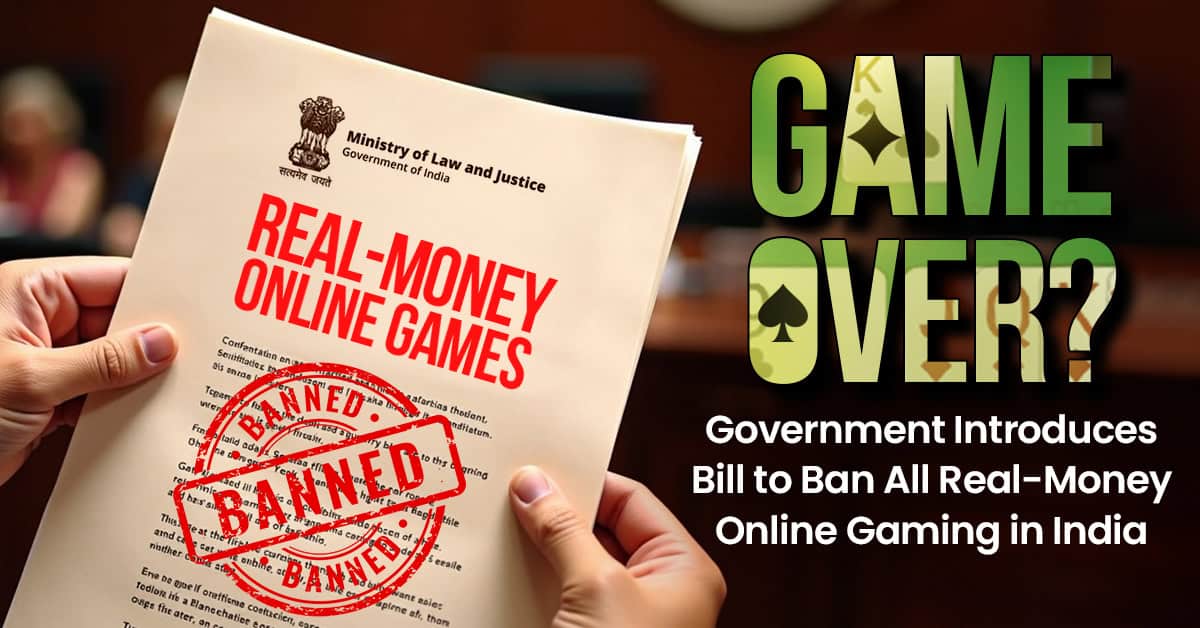Online Gaming Bill 2025: Real-Money Games Banned, Warrant-less Searches, Heavy Penalties
By: Javid Amin | 21 Aug 2025
In one of the most sweeping crackdowns on the digital economy, the Indian Parliament has passed the Promotion and Regulation of Online Gaming Bill, 2025. The legislation bans all forms of real-money online gaming, introduces heavy financial and criminal penalties, and grants warrant-less search and seizure powers to authorities — a move being justified on the grounds of national security, addiction prevention, and financial integrity.
The bill, introduced and passed in the Lok Sabha within hours on August 20 without debate, has triggered massive controversy across political, industry, and civil society circles.
What’s Being Banned?
The bill draws a sharp distinction between “real-money games” (now banned) and “e-sports/social games” (encouraged).
-
Banned (real-money games):
-
Fantasy sports (Dream11, My11Circle, MPL Fantasy)
-
Online poker & rummy platforms
-
Lottery-style gaming apps
-
Any digital game involving monetary stakes or cash payouts
-
-
Allowed (non-monetary games):
-
eSports (skill-based competitive gaming, considered part of India’s Olympic roadmap for 2027)
-
Social and casual games (Candy Crush, PUBG Mobile without money stakes, Free Fire Max, etc.)
-
Key intent: The government claims the law is designed to curb gambling, protect vulnerable users, and stop financial crimes.
Penalties & Enforcement
The Bill prescribes some of the harshest punishments in India’s digital regulatory framework.
| Offense | Punishment |
|---|---|
| Offering real-money games | Up to 3 years’ jail or ₹1 crore fine |
| Advertising/promoting such games | Up to 2 years’ jail or ₹50 lakh fine |
| Financial transactions for banned games | Treated same as offering (3 years or ₹1 crore) |
| Repeat offenses | 3–5 years imprisonment and fines up to ₹2 crore |
👉 Importantly, banks and payment gateways are legally barred from processing transactions linked to banned games.
Surveillance & Warrant-less Searches
One of the most controversial features of the Bill is its surveillance and policing framework.
-
Cognizable & non-bailable offenses: Certain violations can lead to immediate arrests without a warrant.
-
Search & seizure powers: Designated authorities can enter premises, seize servers, and arrest individuals without prior judicial approval.
-
Justification given: The government cites risks of terror financing, money laundering, and illegal cross-border communication through gaming apps.
Critics, however, fear that this opens the door to arbitrary misuse and overreach, creating a chilling effect on India’s digital economy.
Industry Impact
India’s gaming sector has been one of the fastest growing globally, expected to touch $9 billion by 2029. This Bill throws a massive wrench into that trajectory.
-
Jobs & economy: Industry bodies warn of 200,000 job losses and ₹20,000 crore in tax revenue evaporation.
-
Startups at risk: Platforms like Dream11, MPL, RummyCircle, and PokerBaazi face an existential crisis. Some may pivot to subscription or non-monetary engagement models, but viability is uncertain.
-
Cricket sponsorships hit: IPL and other tournaments, heavily sponsored by fantasy sports companies, may lose major revenue streams.
-
Offshore migration: The All India Gaming Federation (AIGF), EGF, and FIFS warn that the ban will drive players to illegal foreign platforms, making regulation even harder.
Political & Public Reactions
The passage of the bill without debate has deepened political divides.
-
Opposition anger: Congress MPs Karti Chidambaram and Shashi Tharoor slammed the move as rushed, non-consultative, and anti-startup.
-
Supporters’ stance: BJP leaders and allied groups defend it as a public health and security safeguard, citing rising gaming addiction, suicides linked to gambling losses, and concerns over youth debt traps.
-
Public opinion: Mixed. While parents’ groups welcome the crackdown on gambling-like platforms, lakhs of gamers and small entrepreneurs see it as an assault on digital freedom and innovation.
Esports vs Real-Money Gaming: The New Divide
One striking outcome of the Bill is the formal recognition of eSports as distinct from gambling.
-
Esports boost: The government has pledged support for competitive gaming, viewing it as part of India’s 2027 Olympic ambitions.
-
Fantasy sports collapse: Ironically, fantasy sports (once defended as “games of skill” in Supreme Court judgments) are now clubbed with gambling and outlawed.
This creates a new digital economy hierarchy:
✔️ Esports, casual games → Encouraged, supported
❌ Fantasy & real-money games → Criminalized
Key Takeaways
-
All real-money online games banned — fantasy sports, poker, rummy, lotteries.
-
Harsh penalties: Up to 5 years in jail and ₹2 crore fine for repeat offenses.
-
Warrant-less powers: Authorities can search, seize, and arrest without judicial approval.
-
Esports gain legitimacy, fantasy sports lose legal footing.
-
Industry shaken: Huge job losses, tax revenue collapse, sponsorship disruption.
-
Political battle brewing: Opposition slams bill as rushed and authoritarian.




